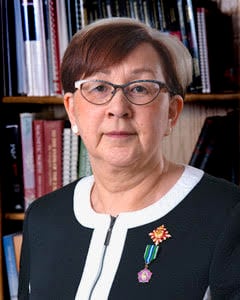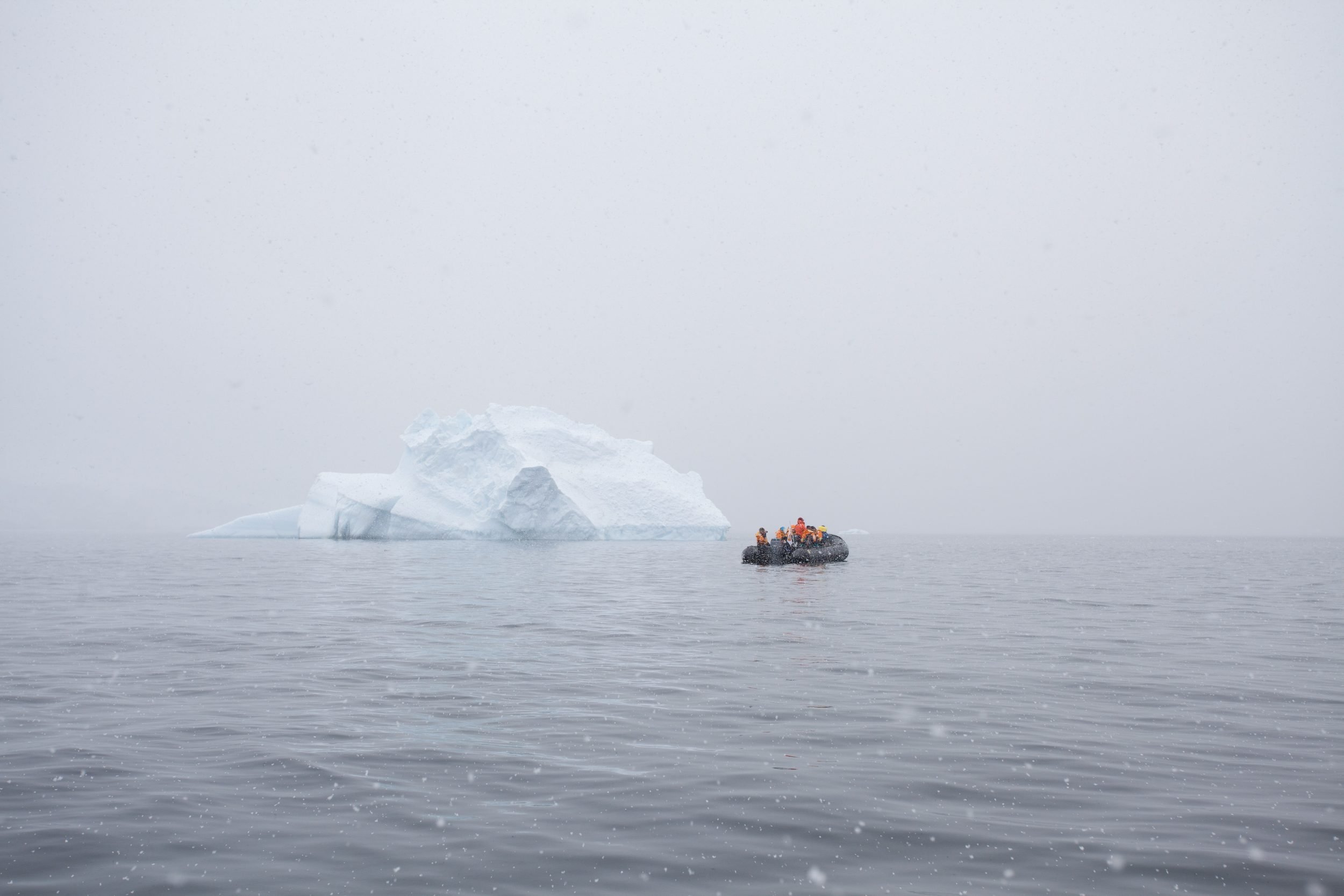The Royal Canadian Geographical Society believes in creating a media landscape in which diverse representation is not just seen or heard, but more importantly — felt.
We have been dedicated to sharing Canadian stories through our iconic publication Canadian Geographic and our education and exploration programs since 1929. The Indigenous Peoples of Turtle Island have carried and passed down stories for millennia — stories that have, until recently, been largely unknown to Canadians. Recognizing that Canada is a tapestry woven from the threads of the cultures and histories of original peoples and newcomers, we are embarking on a journey to make space for Indigenous voices within and beyond our organization.
The program
Administered by the Royal Canadian Geographical Society and Canadian Geographic, the Indigenous Fellowship Program is designed to create full-time hybrid work experiences for Inuit, First Nations and Métis Peoples — providing the opportunity to work either from RCGS headquarters (50 Sussex Drive in Ottawa) or remotely from their home communities. Built for early- to mid-career professionals with some experience and/or education in their desired field of work, the Indigenous Fellowship Program will offer one- to two-year employment contracts to successful applicants in journalism, video, education and design. A high-level summary of the roles and responsibilities is outlined below.
Storytelling, co-creation and mentorship are at the core of everything we do. For nearly a century, Canadian Geographic has been working with some of Canada’s most recognized writers and photographers to deliver award-winning journalism that explores the intersections between people and place. Meanwhile, the Society supports groundbreaking research and expeditions, and creates free curriculum-linked educational resources offered to teachers from coast to coast to coast through Canadian Geographic Education. Along the way, we have engaged some of the country’s boldest thinkers, but there is much more we can do.
We know that transformative change in this country begins with robust Indigenous leadership. We believe that by collaborating with Indigenous Peoples in pursuit of meaningful employment, mentorship, and leadership opportunities in the fields of journalism, storytelling and education, we will help generate systemic change for their communities, the country, and the planet.
Education Fellow: Chloe Bluebird Mustooch
Proudly supported by Weyerhaeuser


Chloe Bluebird Mustooch is an artist, educator and published illustrator of children’s books that bring Indigenous and non-Indigenous communities together. She is a graduate of the Emily Carr University of Art and Design in Vancouver. Bluebird has built her own creative practice while working and teaching through a leading art gallery in Edmonton over the past few years.
As the first Fellow of the Royal Canadian Geographical Society’s Indigenous Fellowship Program, she is helping the Canadian Geographic Education team deepen its connection with First Nations knowledge and communities.
“I look forward to working with the team at Canadian Geographic Education to share my experience as an artist and educator working closely with First Nations students in Alberta and beyond,” says Bluebird Mustooch. “I get a lot of joy working closely with young people in a classroom environment, teaching them the skills of traditional art making and I look forward to sharing that experience with Canadian Geographic Education’s network of educators.”
The Society is currently seeking support for the following Fellowship positions:
Journalism Fellow
What started as a magazine has evolved to become an omnichannel media environment; reaching readers through print, video and digital platforms including our website and social media. Contributing to Canadian Geographic’s core content universe, for print and digital, the Journalism Fellow will be fully integrated into our editorial team. They will actively pitch and produce content, and have the opportunity to weigh in at editorial meetings when we assign and develop stories for the magazine and beyond. Indigenous Fellows may also be asked to create co-branded content to support our program partners.
Video Fellow
As the world undergoes significant changes, Canadian Geographic Films has emerged to support a greater understanding of Canada’s geography — the diverse human and physical landscape — as well as the changes affecting people and the environment. Serving as the film production arm for Canadian Geographic, Can Geo Films has a slate of documentaries and television series in various stages of development, and a series of short films debuting in 2023. The Video Fellow will work across all Can Geo Films and Canadian Geographic video projects, gaining experience as a producer and an editor.
Marketing and Design Fellow
Canadian Geographic’s design team engages in a range of projects across all sectors of the Society. They bring the pages of the magazine to life, create special issues available only on newsstands, design graphics for social media, and the banners you see in the Alex Trebek Theatre or on display in our public galleries when attending a Can Geo Talk. Design is at the core of what we do. An Indigenous Design Fellow would bring essential perspectives to the Canadian Geographic design team.
Program Director
The Director of the Indigenous Fellowship Program will be responsible for developing the program and communicating with the Advisory Council and RCGS Directors to oversee the application and selection process, as well as the project evaluation. The Program Director will meet regularly with the Fellows to ensure there is a healthy balance of learning and creating, support the needs of the Fellows and provide references and connections for future employment opportunities. The Program Director will be responsible for evaluating the Indigenous Fellowship program, finding ways to constantly improve the experience for the Fellows and will work to ensure we have consistent funding for the longevity of the project. The Program Director will report regularly on the program to our project partners and to the RCGS Board of Governors and the Vice-President of Learning and Reconciliation.
Program Advisory Council
The Royal Canadian Geographical Society is committed to diversity and inclusion while recognizing the unique position of Indigenous Peoples on these lands. In order to ensure the integrity of the Indigenous Fellowship Program, the Society has established an Indigenous Advisory Circle to guide the development and implementation of the Program. The Circle will help shape the principles that guide the Program and ensure the Indigenous Fellows’ experiences are positive and beneficial from their perspective.
The Circle will provide high-level guidance and direction for all aspects of the Indigenous Fellowship Program including expectations of RCGS for each Fellowship position, recruitment, honouring and support for Indigenous storytelling, education and journalism. As Fellows move through the program, they may be invited to sit with the Circle to provide guidance and input to continually improve the program as we engage the next cohort.

Duncan McCue
Award-winning broadcaster and educator Duncan McCue is a Professor of Indigenous Journalism and (Story)telling at Carleton University’s School of Journalism. A longtime CBC radio host and TV news correspondent, he’s the author of Decolonizing Journalism: A Guide to Reporting in Indigenous Communities and The Shoe Boy, a memoir of his time spent on a trapline with a Cree family in northern Quebec. Duncan is a proud Anishinaabe, from the Chippewas of Georgina Island First Nation in southern Ontario.

Nellie Kusugak
Nellie Taptaqut Kusugak is a retired professional bilingual teacher with an extensive background in traditional and cultural education, teaching English as a second language and working with community Elders. Fluent in Inuktitut and English, Nellie has been a prominent member of the education community since 1986. Born in a tent in Eskimo Point (Arviat), Nellie attributes her passion for preserving and strengthening her Inuit culture, traditions and language to her parents and her late husband. Nellie served as the fifth commissioner of Nunavut from June 2015 to June 2020.

Gerald Gloade
Gerald Gloade is the Program Development Officer for the Mi’kmawey Debert Project. An artist, educator, storyteller, naturalist, Elder and visionary, his efforts have been integral to expanding cultural understanding and contributing to healing in Mi’kma’ki. Since 2005, Gloade has guided the Debert Project for the Confederacy of Mainland Mi’kmaq, where the land tells its own stories of Mi’kma’ki through 13,000 years of archaeological information. With a Two-Eyed Seeing approach, the Debert Project strengthens understandings of the history of the land to improve its present and future.

Sharon Parenteau
Sharon Parenteau is a Métis educator, originally from the Turtle Mountains, where she grew up surrounded by a large extended family. Sharon has been a leader in her field since graduating university. Sharon graduated with a B. Ed. from the University of Manitoba and started working with Winnipeg School Division as an Inner-City teacher then as a WSD Support Teacher for Indigenous curriculum development. Sharon has represented the Red River Métis on numerous provincial committees, including the Premier’s Advisory Council on Education and the Lieutenant Governor’s Youth Experience Program and advising the Presidents of the Universities and Colleges in Manitoba, receiving awards for her work in the community including the MMF’s Distinguished Leader in Education, the Research and Curriculum Development Award from Aboriginal Circle of Educators as well as a Diamond Jubilee Award.

Amos Scott
Amos Scott is a Tł̨ıchǫ Dene filmmaker, photographer, and former journalist. Amos started his career in journalism, working for CKLB, CBC North, and APTN National News. He then created, directed, and produced the television program Dene: A Journey. Amos is one of the founders of Dene Nahjo, a Dene innovation and arts collective, and the principal of Adze Studios, which helps organizations and businesses produce high quality HD videos and digital content for web, presentations, and marketing. Recently, Amos has made the leap from communications to work supporting Northern Indigenous Guardians and Indigenous led conservation. Amos is project director at the Northern Indigenous Stewardship Circle. He is also the research manager for Dene Nahjo. In that capacity, he has been researching the early days of the Dene Nation. Amos loves to get out in the bush to learn from his ancestors.
“For centuries, the humanity of Indigenous people has been hidden behind stereotypes, myths, and prejudices. Indigenous voices have long been silenced, only allowed to be heard when deemed valid by an ‘expert’ like a priest, scientist, politician, or bureaucrat … Our stories make us human; they are how we pass on culture, language, and ways of life. They’re how we connect with our families and ancestors.”Ossie Michelin, writer and director
Why us? Why now?
When the RCGS embarked on creating the Indigenous Peoples Atlas of Canada in 2017 — published in partnership with the Assembly of First Nations, Inuit Tapiriit Kanatami, the Métis National Council, Indspire and the National Centre for Truth and Reconciliation — Canadian Geographic developed a strict set of principles for engaging with Indigenous Peoples as they shared their knowledge. At the core of our process was the recognition that these are not our stories to tell, we are just a mechanism to amplify their reach. We worked alongside Elders, Knowledge Carriers, educators and Survivors to weave their teachings and stories into the pages, then engaged Indigenous writers and photographers to bring the pages to life, pages that were designed by Indigenous designers.
This process and these learnings were transformational for the Society, and we have continued to work with Indigenous professionals on all Indigenous content through Indigenous led processes— but we can and must do much more. Canadian Geographic and the Royal Canadian Geographical Society are committed to continuing our learning and collaboration, contributing to a more respectful and inclusive future. The Indigenous Fellowship Program offers applicants opportunities to steer the shifting narrative of this country while accessing mentorship with our team of industry-leading professionals. We want and need Indigenous voices pitching and developing content — and Indigenous educators creating resources for all Canadian students.
For more information please contact:
Charlene Bearhead
Vice President – Learning and Reconciliation, Canadian Geographic
[email protected]
(780-932-3520)



